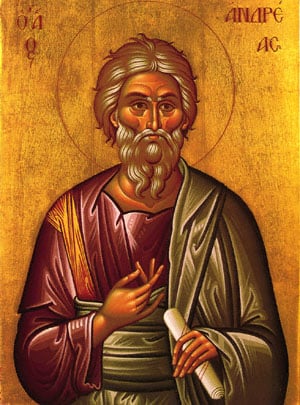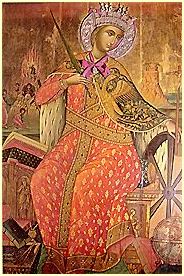In many and various ways God spoke of old to our fathers by the prophets; but in these last days He has spoken to us by a Son, Whom He appointed the heir of all things, through Whom also He created the world. He reflects the glory of God and bears the very stamp of His nature, upholding the universe by His word of power. When He had made purification for sins, He sat down at the right hand of the Majesty on high, having become as much superior to angels as the name He has obtained is more excellent than theirs. The Son Is Superior to Angels for to what angel did God ever say,
“Thou art my Son, today I have begotten Thee”? Or again, “I will be to Him a Father, and He shall be to Me a son”?
And again, when He brings the first-born into the world, He says,
“Let all God’s angels worship him.”
Of the angels He says, “Who makes His angels winds, and His servants flames of fire.”
But of the Son He says, “Thy throne, O God is for ever and ever,
the righteous scepter is the scepter of Thy kingdom.
Thou hast loved righteousness and hated lawlessness;
therefore God, Thy God, has anointed Thee with the oil of gladness beyond thy comrades.”
And, “Thou, Lord, didst found the earth in the beginning,
and the heavens are the work of Thy hands; they will perish, but Thou remainest;
they will all grow old like a garment, like a mantle thou wilt roll them up,
and they will be changed. But Thou art the same, and Thy years will never end.”
Hebrews 1:1-12 (Epistle from the Vesperal Liturgy of the Nativity)
The Prayer Team messages this week will focus on the Scriptures read at the services celebrated on the Eve of Nativity and at the Feast of the Nativity. Today and Monday, December 23 will be the Scriptures from the Vesperal Liturgy of Christmas Eve, and then Tuesday, December 24 and Wednesday, December 25, will be the Scriptures from the Liturgy of the Nativity.
The Vesperal Liturgy (and when the Nativity falls on a Sunday or Monday, the Vespers) of the Nativity includes several readings from the Old Testament that set the stage for the account of the Nativity to be told. This is one of the reasons I am so enthralled with this service (as well as the Royal Hours), and why I encourage you to attend one of them—because the Nativity is foretold in its entirety in the Old Testament and is summarized in the Old Testament readings at these services.
The first reading at the Vesperal Liturgy (or Vespers, at it will be this year) is the account from Genesis of the Creation of the world. The Epistle reading at the Vesperal Liturgy circles back to Creation as well. The reading from Genesis emphasizes that God created the world. It was not created by us. In fact, when someone asks me “what do I need to believe in order to be a Christian?” the first thing I answer is, “that God (greater than us) created us.” The first chapter in the history of the world is that God made the heavens and the earth. He made the plants and the animals, the stars, the seas, the seasons. He also made human beings in His image and likeness. He made us to be in communion with Him.
God told the human beings that they could have dominion over everything He created, except they were not to touch the tree of the knowledge of good and evil. Because while God had created man in His image and likeness, to be in communion with Him, He didn’t want to impose that will on us. He wanted us to freely follow. So, He put a test in front of us, so that we would have the option to choose Him or not choose Him. This is called free will. Without free will, without the option to go away from God, God would be a controlling God and we would be relegated to the status of slave, forced to be in communion with God. So, God gave us a choice, to be with Him or to go away from Him.
Mankind chose to go away from God. We fell to temptation by partaking of the forbidden fruit. With this act, the world fell and sin entered the world. This is called “The Fall.” The consequence of the Fall is that our relationship with God was tainted. No longer could we share Paradise with God. Because to be in Paradise is to be perfect, to be like God, and because of the Fall, we were no longer like God.
God expelled mankind from Paradise. And He put an angel to guard the door of Paradise. In essence, there was now a wall of separation between us and God. Immediately, however, God set into action a plan for our redemption. It would involve a covenant with Abraham, enslavement and eventual escape from Egypt, the Law given to Moses, and judges, kings and prophets who would set the stage for a promised Messiah. The Feast of the Nativity marks the event when the Messiah entered the world. The Messiah is the only-begotten Son of God, Jesus Christ.
The Epistle reading as we begin the feast identifies Jesus Christ as the Son of God, present from the Creation of the world, and therefore uncreated. This is why in Hebrews 1:2, St. Paul writes that God “has spoken to us by a Son, Whom He appointed heir of all things, through Whom also He created the world.” The salvation of mankind, therefore, does not come about through a created entity but through the Incarnate, uncreated Son of God. Saint Paul continues, “He reflects the glory of God and bears the very stamp of His nature, upholding the universe by His word of power.” (1:3) Of course, Saint Paul wrote after the Resurrection, so in this brief passage, He summarizes not only the Creation and the Nativity but the Resurrection and Ascension: “When He had made purification for sins, He sat down at the right hand of the Majesty on high.” (1:3)
Saint Paul writes that Jesus Christ is superior to all the angels. He also establishes the relationship between God the Father and Jesus Christ as Father and Son. Indeed the Incarnation is a “mystery” in many ways. We begin to understand its significance by understanding the Creation and the Fall and why we need a Savior to restore our image and again unlock the door to Paradise.
Come, let us rejoice in the Lord, as we tell about this mystery. The middle wall of separation has been broken down; the fiery sword has turned back, the Cherubim permits access to the tree of life; and I partake of the delight of Paradise, from which I was cast out because of disobedience. For the exact Image of the Father, the express Image of His eternity, takes the form of a servant, coming forth from a Virgin Mother; and He undergoes no change. He remained what He was, true God; and He took up what He was not, becoming human in His love for humanity. Let us cry out to Him: “You who were born of a Virgin, O God, have mercy on us. (Stichera, Vespers of the Nativity, Trans. by Fr. Seraphim Dedes)
Christ is uncreated God, the second person of the Holy Trinity. Christ became a human being at the Incarnation. This is the significance of the Incarnation, that the wall between us and God, put there at the Fall, came down and again, as before the Fall, the human beings walked in the presence of God.

